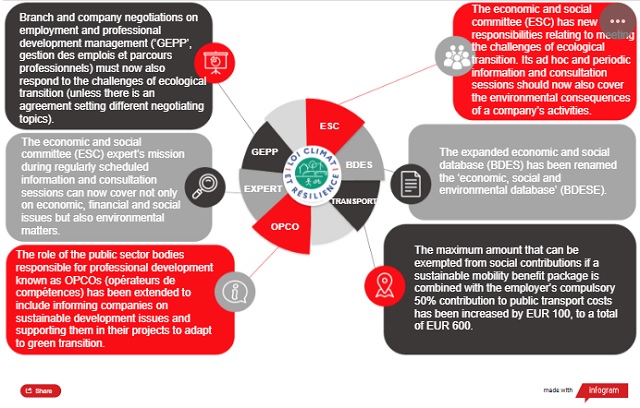Ius Laboris are most popular:
- within Government, Public Sector, Antitrust/Competition Law and Wealth Management topic(s)
- with Senior Company Executives, HR and Inhouse Counsel
- with readers working within the Consumer Industries, Healthcare and Technology industries
The new French Climate and Resilience Law, which came into force in August 2021, implements important changes for employers. This table sets out the key new stakeholder responsibilities and employer duties.

| ESC | The ESC is the economic and social committee, the employee representative body. Under the Climate Law, it has new responsibilities relating to meeting the challenges of ecological transition. Its ad hoc and periodic information and consultation sessions should now also cover the environmental consequences of an organisation's activities. |
| OPCO | OPCOs (opérateurs de compétences) are public sector bodies responsible for professional development. Their role has now been extended to include informing companies on sustainable development issues and supporting them in their projects to adapt to green transition. |
| ESC EXPERT | The ESC appoints an expert accountant to provide it with information and report on how the company is doing against a range of metrics. Under the new Law, the ESC expert's mission during regularly scheduled information and consultation sessions can now cover not only on economic, financial and social issues but also environmental matters. |
| BDES | The economic and social database (BDES) in which organisations gather the information they have to provide to the ESC has now been renamed the 'economic, social and environmental database' (BDESE). |
| TRANSPORT | The maximum amount that can be exempted from social contributions if a sustainable mobility benefit package is combined with the employer's compulsory 50% contribution to public transport costs has been increased by EUR 100, to a total of EUR 600. |
The content of this article is intended to provide a general guide to the subject matter. Specialist advice should be sought about your specific circumstances.

